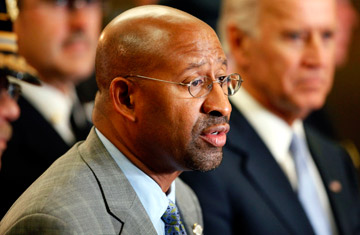
Mayor Michael Nutter of Philadelphia speaks after a roundtable discussion about the impact of budget cuts on the police force as Vice President Joe Biden, right, listens, Oct. 18, 2011, in Philadelphia.
Amid the throes of the summer's heated and bitterly partisan debates over the federal debt, President Obama channeled the frustrations of most Americans when he remarked that they voted for divided government, not dysfunctional government. Since then, it appears this dysfunction is likely to continue for the foreseeable future.
But it would be foolhardy to confuse the health of the debate in our nation's capital with that of the country as a whole, or the vitality of our federal government with that of our federal republic.
In fact, we find America — or, more precisely, our states, cities and metropolitan areas — awash in leadership and increasingly governed by a Pragmatic Caucus of political, business, university and civic leaders. In sharp contrast to Beltway polarization, these leaders are acting decisively to grow jobs in the near term and retool their metropolitan economies for the long-haul.
The rise of a Pragmatic Caucus at a time of federal inaction reflects the genius of American democracy. The U.S. is not just the federal government. It is also a union of states, and perhaps more importantly, a network of cities and metropolitan areas.
States matter constitutionally, sharing responsibility for shaping the economy, safeguarding the environment and caring for our most vulnerable and disadvantaged.
Cities and metros dominate economically as they concentrate and agglomerate the innovative firms, talented workers, risk-taking entrepreneurs and supportive ecosystems of universities, community colleges and business associations that drive modern economies.
Members of the Pragmatic Caucus share common ground even if they have different political or ideological leanings. They are close to the ground, and prize place over party, collaboration over conflict and solution over dogma. They form what Philadelphia Mayor Michael Nutter likes to call the "Get Stuff Done" party.
Mayors, not surprisingly, are charter members of the Pragmatic Caucus, since so many duties of local office — from providing basic services to regenerating blighted neighborhoods to preparing for and responding to natural disasters like Hurricane Irene — require practical rather than political solutions and demand leaders who are hungry for results and impatient with ideological grandstanding.
The current cast of U.S. mayors — both Republicans and Democrats — is one of the best in modern memory. But the Pragmatic Caucus extends far beyond elected officials to include enterprising presidents of major universities, major philanthropic leaders and the heads of influential metropolitan business organizations.
Governors, too, are getting the message about metropolitan power. Colorado, New York and Tennessee, for example, have all initiated state economic development strategies that intentionally build upon and align with the distinctive strategies of each state's cities, counties and metropolitan areas. This is not surprising since the Governors of these states are all either former Mayors or individuals with deep experience with urban issues. Others, like Rick Snyder of Michigan, have brought deep business backgrounds and a focus on tangible results and short-term deliverables.
